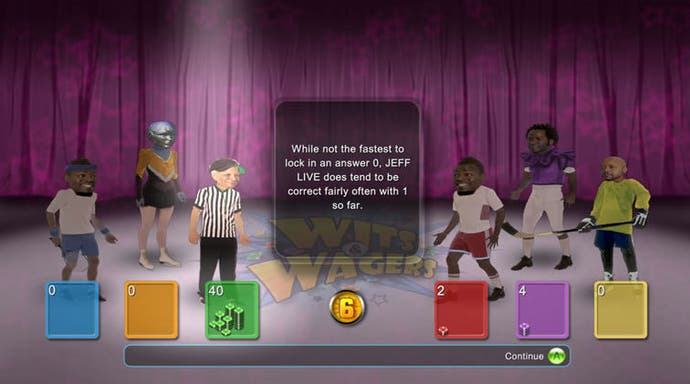Wits & Wagers
Don't bet on it.
With a title that sounds like a smug Radio 4 panel game, possibly involving Sandi Toksvig, Wits & Wagers is aiming for that fabled and oh-so-desirable casual gamer, but seems at a loss as to how best to appeal to this audience.
It's a quiz game, actually based on a board game, albeit one where specific knowledge and correct answers take a backseat to guesswork. Each game consists of seven questions with a numerical or statistical bent. For instance, how many mountains over 3000 feet tall are there in Scotland? All the players make their best guess before the timer counts down, trying to get closest to the actual answer without going over. This, I presume, is the "wits" part of the equation.
The wagers come just before the answer is revealed. Everyone's guesses are shown, from highest to lowest, along with the odds of them being right. All players start with five casino chips which can be bet against the answer (or answers - you can split your bet into two) that seems most likely to be correct. You can put your money against your own guess, or another player's if you think they're smarter than you. Or just better at guessing. Chips are then earned for getting the closest to the right answer, or for backing the correct guess. The winner, obviously, is the one with the most chips at the end.
You can have up to six players, there's Xbox Live play through private invites or a quick match against random opponents. Everyone chooses a puppet-like avatar with faces drawn from a selection of other people's photos, but if that's simply too creepy for you, there are some comedy options like alien heads, skulls and sinister clowns. If you have the Live Vision camera you can use that instead, in which case you appear on a TV with arms and legs, a bit like Evil Edna from Will 'O The Wisp but marginally less scary. The right stick allows you to jiggle your unholy puppet creature about on the screen, which at least gives you something to do during the overlong countdowns and unskippable animations.

Developer Hidden Path certainly deserves some credit for coming up with a more offbeat spin on the quiz format than most, but the game is hobbled by some recurring niggles that leave the whole somewhat less than engaging.
The rule about guessing as close as possible to the correct answer without going over throws up some very annoying quirks, for instance. One of the questions asked for the length, in days, of John F. Kennedy's presidency. I had a pretty good idea of what this might be, since I knew he was elected sometime in January 1961 and assassinated on November 22 1963. A quick burst of mental arithmetic and I figured 1040 days was a pretty solid guess. It was a pretty solid guess - JFK was actually in office for 1036 days. However, my guess was four days over the actual answer so the points instead went to an AI player whose guess was out by over a year - simply because they guessed lower. This arbitrary rule doesn't add anything tactical to the gameplay, yet in a game so reliant on guesswork it seems strange to penalise players in this manner.
The other problem is that the questions are so bloody dull. It's as if they bookmarked the UK Statistics Authority and just cut-and-pasted whatever they could find. The questions all seem to be very UK-based (and occasionally European), which means they've either created a separate version for the US, or there are a lot of American gamers trying to grapple with the number of High Court judges in England and Wales.

Now, I have no problem with a trivia game that chooses a less fluffy form of trivia than its peers - we've got plenty of movie and music quizzes already, thanks - but Wits & Wagers feels too much like some sort of GCSE revision module. Questions based on the member states of the EU, the official UK employment figures or the formation of OPEC are simply too dry and boring to gel with a ker-azy casual game in which you can waggle your in-game arms for no apparent reason. The questions aren't always terribly well-phrased either. One asked for the median household income for Londoners between 2004/2005 - try to contain your excitement, folks. The highest possible answer was 700 pounds, but it neglected to say across what timeframe. Daily? Weekly? Monthly? It doesn't really matter - you just take a wild stab in the dark as always.
When you've got a quiz where players don't even need to understand the question to win, you've got a quiz that doesn't really work all that well. Rather than a chance to show off what you know, all too often you're getting the chance to guess about stuff you don't. Even when served up in these short seven-question chunks (which were repeating within my first five games) it simply feels too vague for a truly satisfying quiz experience. The incentive to keep playing, especially in a party atmosphere, simply isn't there. Hey! Who wants to play that game where you make wild guesses about bland census statistics? Anyone? Hello? Sigh. Another night alone...

